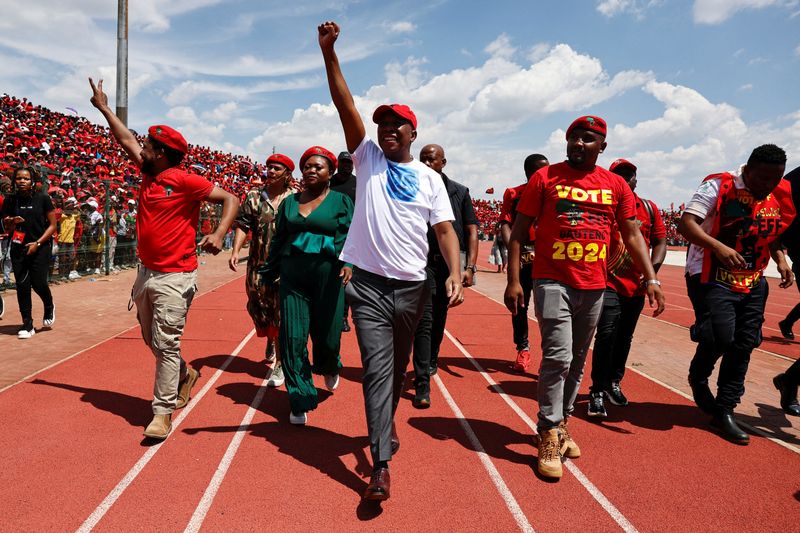By Tim Cocks
JOHANNESBURG (Reuters) -South Africa's Julius Malema, who quit the ruling African National Congress to form a radical leftist party, could potentially become a kingmaker or even deputy president if the ANC loses its majority as early election results suggest.
The prospect of the ANC co-opting Malema and his Economic Freedom Fighters (EFF) to stay in power after Wednesday's election strikes fear into investors and the white upper-middle class he rails against.
The EFF's promises to nationalise the country's gold and platinum mines and seize land from white farmers are among proposals they fear threaten not just their privileges but also Africa's most industrialised economy.
Malema's pledge to redress persistent racial and economic disparities resonates with his constituents which include tens of thousands of unemployed, disenfranchised urban Black youths and middle class students struggling to afford fees or graduates unable to find decent jobs in a stagnant economy.
The ANC liberated Black South Africans from white minority rule, but the widespread prosperity it promised three decades ago has yet to materialise. Meanwhile the very richest - both Black and white - have seen their share of the wealth expand.
A third of South Africans, including many Black voters with college degrees, are out of work.
"The EFF points out accurately ... that we haven't solved the racial issue in this country," Steven Friedman, director of South Africa's Centre for the Study of Democracy, said.
Yet, he added that Malema had failed to broaden the party's appeal to those in extreme poverty in rural areas.
The EFF, reminiscent of socialist movements of the past with its trademark red shirts and berets, captured more than 10% of the vote in national polls in 2019 and 2021 local ones.
However, Malema's wealth and lifestyle have attracted criticism from political rivals who deride his penchant for flashy cars, gold watches, champagne and luxury mansions in leafy suburbs. He sold one such mansion, complete with a cinema and a cigar lounge to pay off $1 million in tax arrears.
He has also faced allegations of corruption, which he denies. In 2015, a court threw out money laundering charges against him relating to government contracts.
'SOWING DIVISION'
At a late 2020 rally in Senekal, in the largely agrarian Free State province, dozens of Malema's Black supporters in red shirts were facing off with a small group of white supremacists, some donning apartheid-era army uniforms.
The tension was palpable until an EFF security guard called over one of the white counter-protestors with a friendly gesture. After talking, each then faced their side and made calming hand signals, defusing the row.
It was typical of Malema's ability to turn up the heat on the country's simmering racial and class tensions without them boiling over.
Born the son of a domestic worker for an Indian family in Limpopo, north of Johannesburg, Malema was politically active from a young age and rose through the ranks to ANC Youth League president in 2008.
He founded his breakaway party after the ruling ANC suspended him as youth leader in 2011 for "sowing division".
While his followers affectionately call him "Juju" - short for Julius - Malema's detractors prefer names like "firebrand", "militant" "clown" or "populist".
Yet in a nation in which the main populist issue is hostility towards migrants from other African countries, his party is the only one that seeks to repeal policies that hinder the free movement of Africans.

"The EFF is swimming against the tide when it comes to immigration," Chris Ogunmodede, analyst and editor of World Politics Review, said. "(It) will likely lose out (on) many votes it might otherwise get."
Although Malema briefly flirted with xenophobia in January 2022, when he announced visits to restaurants to check they were not employing too many foreigners, he never repeated the stunt.